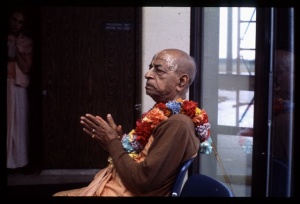SB 6.2.26

A.C. Bhaktivedanta Swami Prabhupada
TEXT 26
- aho me paramaṁ kaṣṭam
- abhūd avijitātmanaḥ
- yena viplāvitaṁ brahma
- vṛṣalyāṁ jāyatātmanā
SYNONYMS
aho — alas; me — my; paramam — extreme; kaṣṭam — miserable condition; abhūt — became; avijita-ātmanaḥ — because my senses were uncontrolled; yena — by which; viplāvitam — destroyed; brahma — all my brahminical qualifications; vṛṣalyām — through a śūdrāṇī, a maidservant; jāyatā — being born; ātmanā — by me.
TRANSLATION
Ajāmila said: Alas, being a servant of my senses, how degraded I became! I fell down from my position as a duly qualified brāhmaṇa and begot children in the womb of a prostitute.
PURPORT
The men of the higher classes—the brāhmaṇas, kṣatriyas and vaiśyas—do not beget children in the wombs of lower-class women. Therefore the custom in Vedic society is to examine the horoscopes of a girl and boy being considered for marriage to see whether their combination is suitable. Vedic astrology reveals whether one has been born in the vipra-varṇa, kṣatriya-varṇa, vaiśya-varṇa or śūdra-varṇa, according to the three qualities of material nature. This must be examined because a marriage between a boy of the vipra-varṇa and a girl of the śūdra-varṇa is incompatible; married life would be miserable for both husband and wife. Consequently a boy should marry a girl of the same category. Of course, this is trai-guṇya, a material calculation according to the Vedas, but if the boy and girl are devotees there need be no such considerations. A devotee is transcendental, and therefore in a marriage between devotees, the boy and girl form a very happy combination.